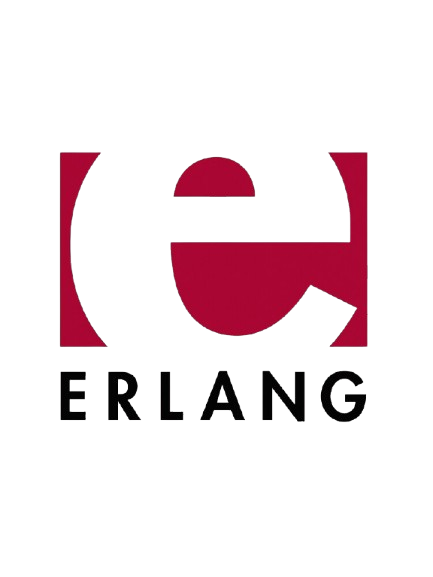Tehnology
Choosing the right web technologies is crucial for a project's success. It impacts performance, scalability, development speed, maintenance, and user experience, ensuring the solution aligns with goals, budget, and future growth
Go
Go is a high-performance and concise open-source programming language designed for building scalable, fault-tolerant systems and microservices.
Its strong typing, built-in concurrency support (via goroutines), and simple syntax make Go an ideal choice for backend development, network applications, high-load systems, and cloud infrastructure.
Developed at Google by Rob Pike, Ken Thompson, and Robert Griesemer, Go has won the hearts of engineers around the world thanks to its fast compilation, static linking, and transparent dependency management.
10 major U.S.-based projects using Go:
Docker , Kubernetes, Terraform, Uber, Netflix, Dropbox, Cloudflare, Twitch, Heroku, Reddit .
Erlang
Erlang is a battle-tested, open-source programming language created by Ericsson for building highly concurrent, fault-tolerant, and distributed systems.
With its lightweight processes, message-passing model, and hot code swapping, Erlang excels in real-time systems, telecoms, and any app requiring ultra-high availability.
Originally designed in the 1980s, Erlang still powers critical infrastructure today, thanks to its rock-solid stability, distributed nature, and ability to handle millions of concurrent connections.
10 major projects using Erlang:
WhatsApp, RabbitMQ, CouchDB, Ericsson switches, Klarna, Facebook Chat (early), Riak, AdRoll, Heroku’s routing layer, Cisco switches.

Node js
Node.js is a fast, lightweight, and scalable JavaScript runtime built on Chrome's V8 engine.
It enables developers to build server-side applications with non-blocking, event-driven architecture.
Widely used for web applications, APIs, and microservices, Node.js supports high concurrency and scalability, making it ideal for modern, real-time, and high-traffic applications.
10 big American projects using Node.js: Netflix, LinkedIn, PayPal, Uber, eBay, Walmart, NASA, Twitter, Reddit, Trello
These projects showcase Node.js versatility and efficiency in diverse industries.
Android
Android is the world’s most popular mobile operating system, providing an open-source platform for building innovative and user-friendly mobile applications.
Backed by Google, Android offers powerful tools like Jetpack Compose, Kotlin support, Material Design, and robust APIs for building native apps with smooth performance and modern UI.
With billions of active devices worldwide, Android empowers developers to create apps that reach a global audience across smartphones, tablets, TVs, and wearables.
10 major U.S.-based apps built with Android:
Spotify, Instagram, Snapchat, Google Maps, Airbnb, Pinterest, LinkedIn, YouTube, Reddit, Uber.
iOS
iOS is Apple's powerful and secure mobile operating system designed for iPhones and iPads.
Known for its smooth performance, tight hardware integration, and developer-friendly APIs, iOS empowers developers to build sleek, responsive, and high-performance mobile applications.
With native development using Swift or Objective-C, and tools like Xcode and SwiftUI, iOS is ideal for premium apps with rich user experiences.
10 major U.S.-based apps built for iOS:
Instagram, Uber, Airbnb, Spotify, Robinhood, Snapchat, DoorDash, Tinder, Venmo, Pinterest
These apps showcase iOS's dominance in mobile innovation across industries from social networking to fintech.
Angular
Angular is a powerful open-source framework for developing scalable, feature-rich web applications.
Its component-based architecture, TypeScript integration, and efficient data binding make it ideal for enterprise-level solutions.
Angular, developed by Google.
10 major U.S.-based projects using Angular: Gmail, Microsoft Office Online, Upwork, PayPal, The Weather Channel, Forbes, JetBlue Airways, HBO Max, Capital One, Bloomberg.
These demonstrate Angular reliability and versatility in large-scale applications across industries like finance, media, and technology.
React.js
React.js is a powerful JavaScript library for building user interfaces, maintained by Facebook.
Known for its component-based architecture and virtual DOM, React.js simplifies the creation of dynamic, high-performance web applications.
Its flexibility and scalability make it a top choice for modern front-end development.
10 big American projects using React.js: Facebook, Instagram, Airbnb, Netflix, Uber Eats, Reddit, Salesforce, WhatsApp Web, Dropbox, Tesla.
These projects highlight React.js effectiveness in creating responsive and scalable applications.
Tailwind
Tailwind is a utility-first CSS framework for rapidly building custom user interfaces.
It provides pre-designed classes for styling, enabling developers to create responsive and modern designs directly in HTML without writing custom CSS..
Tailwind,flexibility and efficiency make it popular for both small projects and large-scale applications..
10 big American projects using Tailwind: GitHub, Netflix, Kickstarter, Discord, Vercel, Coinbase, DigitalOcean, Lyft, Reddit, Stripe.
These projects showcase Tailwind versatility in creating sleek and maintainable user interfaces.